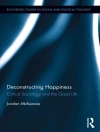The purpose of this book is to make an effort to bring together a body of research on the subjective aspects of quality of life ("subjective well being", "happiness", "life satisfaction", "perceived quality of life") by starting out with Wilson’s (1968) theory of avowed happiness. I build on Wilson’s theory by applying diverse but selected fmdings from the ever-burgeoning quality-of-life literature. Wilson’s theory of happiness can be captured by two key postulates. These were summarised by Diener, Suh, Lucas, and Smith (1999). They stated that fulfilment of needs causes happiness, whereas the persistence of unfulfilled needs causes unhappiness. The degree of need fulfillment required to produce satisfaction depends on the adaptation level of the needs, which is influenced by past experience, comparisons with others, personal values, among others. Well, the literature on the subjective aspects of quality of life has grown by leaps and bounds since 1967. Diener (1984) and Diener et al. (1999) did a greatjob reviewing a small part of this voluminous and growing literature. But the literature remains quite fragmented. It needs synthesis and integration. Furthermore, the literature needs to answer the "so what" question. I make an attempt in this book to pull the literature together. I do so by providing a common theoretical language that serves to establish a nomological network.
M. Joseph Sirgy
Psychology of Quality of Life [PDF ebook]
Psychology of Quality of Life [PDF ebook]
¡Compre este libro electrónico y obtenga 1 más GRATIS!
Idioma Inglés ● Formato PDF ● ISBN 9789401599047 ● Editorial Springer Netherlands ● Publicado 2013 ● Descargable 3 veces ● Divisa EUR ● ID 4707243 ● Protección de copia Adobe DRM
Requiere lector de ebook con capacidad DRM












